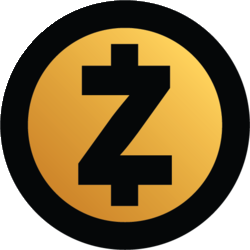Grayscale Files to Convert Zcash Trust into Spot ETF Amid Rising Demand and Regulatory Scrutiny
ZEC/USDT
$444,176,201.48
$223.96 / $203.50
Change: $20.46 (10.05%)
+0.0004%
Longs pay
Contents
Grayscale has filed to convert its Zcash Trust into a spot ETF, known as ZCSH, amid Zcash’s 1,000% surge in 2025 and growing adoption of its privacy features, providing investors regulated access to ZEC through NYSE Arca listing with Coinbase as custodian.
-
Zcash’s 1,000% price surge in 2025 and 30% shielded transaction growth highlight strong demand for a spot ETF.
-
The proposed ZCSH ETF will feature a 2.5% management fee, cash creations initially, and potential in-kind redemptions pending SEC approval.
-
Grayscale’s successful Bitcoin and Ethereum ETF conversions in 2024 bolster the case, though privacy coins face ongoing regulatory review.
Discover Grayscale’s Zcash spot ETF filing: surging ZEC demand, privacy adoption rise, and ETF details. Stay informed on crypto regulations and investment opportunities in 2025. Read more now.
What is Grayscale’s Zcash Spot ETF Proposal?
Grayscale’s Zcash spot ETF is a proposed exchange-traded fund that would convert the existing Grayscale Zcash Trust into a product holding actual ZEC tokens, offering investors direct exposure without managing the cryptocurrency themselves. Filed via Form S-3 with the U.S. Securities and Exchange Commission, the ETF aims to list on NYSE Arca under the ticker ZCSH, with Coinbase serving as custodian and prime broker. This initiative follows Zcash’s remarkable performance and increasing institutional interest in privacy-focused assets.
How Does the Structure of the Proposed Zcash ETF Work?
The ZCSH ETF would operate by holding physical Zcash in custody, with shares created and redeemed in baskets of 10,000 units, equivalent to approximately 817 ZEC based on recent pricing. Initially, the fund plans to use cash-only creations and redemptions to simplify operations, potentially transitioning to in-kind exchanges if the SEC approves further modifications. The Bank of New York Mellon will handle administrative and transfer agent roles, ensuring robust oversight.
As of late November, the trust already managed around 394,400 ZEC, valued at roughly $199.2 million, demonstrating a solid foundation for the ETF. The annual sponsor fee is set at 2.5%, aligning with industry standards for similar products. Grayscale emphasizes in the filing that the ETF would provide transparent, regulated access to ZEC, mitigating some risks associated with direct cryptocurrency ownership.
Data from on-chain analytics shows Zcash’s shielded pool activity has grown significantly, with 30% of transactions now privacy-enhanced and 20-25% of the total ZEC supply held in encrypted addresses. This trend, reported by blockchain explorers like those from Electric Coin Company, underscores ZEC’s utility in enhancing financial privacy. Experts note that such adoption could drive further institutional inflows if the ETF gains approval.
Regulatory precedents from Grayscale’s prior successes, including the 2024 conversions of Bitcoin and Ethereum trusts into spot ETFs, provide a roadmap. According to SEC filings, these approvals took several months, with the Bitcoin ETF decision spanning about three months from filing to launch. For Zcash, the focus on privacy features may invite additional scrutiny, but Grayscale’s experience positions it well.
Institutional moves, such as Reliance Group’s full allocation to ZEC in its crypto portfolio, as announced in public statements, further validate the asset’s momentum. Zcash has overtaken Monero in market capitalization, becoming the leading privacy coin with a valuation exceeding $1 billion in 2025. The Winklevoss brothers’ Cypherpunk initiative, which established a public ZEC treasury, also signals broadening appeal among high-profile investors.
Frequently Asked Questions
What Are the Key Risks in Grayscale’s Zcash Spot ETF Filing?
The primary risks include regulatory hurdles due to Zcash’s privacy emphasis, which has drawn SEC attention in past reviews of similar assets. Market volatility remains high, with ZEC’s speculative nature potentially leading to sharp price swings. Grayscale’s filing acknowledges these, stressing diversified investor strategies and the ETF’s structure to limit direct exposure impacts, all while maintaining compliance with federal securities laws.
Why Is Zcash Experiencing Increased Demand in 2025?
Zcash is seeing heightened demand thanks to its robust privacy protocol using zk-SNARKs technology, which allows for shielded transactions that protect user identities without compromising the blockchain’s integrity. With a 1,000% price increase this year and 40% in the past month alone, plus growing adoption by institutions like Reliance Group, it’s becoming a go-to for privacy-conscious users and investors alike.
Key Takeaways
- Zcash’s Surge in Adoption: Over 30% of transactions now use shielded pools, with 20-25% of supply in encrypted addresses, driving Grayscale’s ETF push for regulated access.
- ETF Operational Details: ZCSH will list on NYSE Arca with a 2.5% fee, starting with cash redemptions and potential in-kind later, holding 394,400 ZEC worth $199.2 million.
- Regulatory Outlook: Building on 2024 Bitcoin and Ethereum successes, approval could take months, but privacy scrutiny adds uncertainty—monitor SEC updates closely.
Conclusion
Grayscale’s filing for a Zcash spot ETF marks a pivotal step in bringing privacy-enhanced cryptocurrencies like ZEC into mainstream regulated investment vehicles, fueled by the asset’s explosive 1,000% growth and rising shielded adoption in 2025. As institutional interest from entities like Reliance Group and the Winklevoss brothers grows, this proposal could expand access while navigating privacy coin regulations. Investors should watch for SEC decisions, positioning Zcash as a key player in the evolving crypto landscape for enhanced financial privacy and returns.
Comments
Other Articles
Bitcoin Price Analysis: Will the Uptrend Continue?
3/1/2026
Ethereum 2.0 Update: How Will It Affect the Crypto Market?
2/28/2026
The Coming of Altcoin Season: Which Coins Will Stand Out?
2/27/2026
DeFi Protocols and Yield Farming Strategies
2/26/2026
